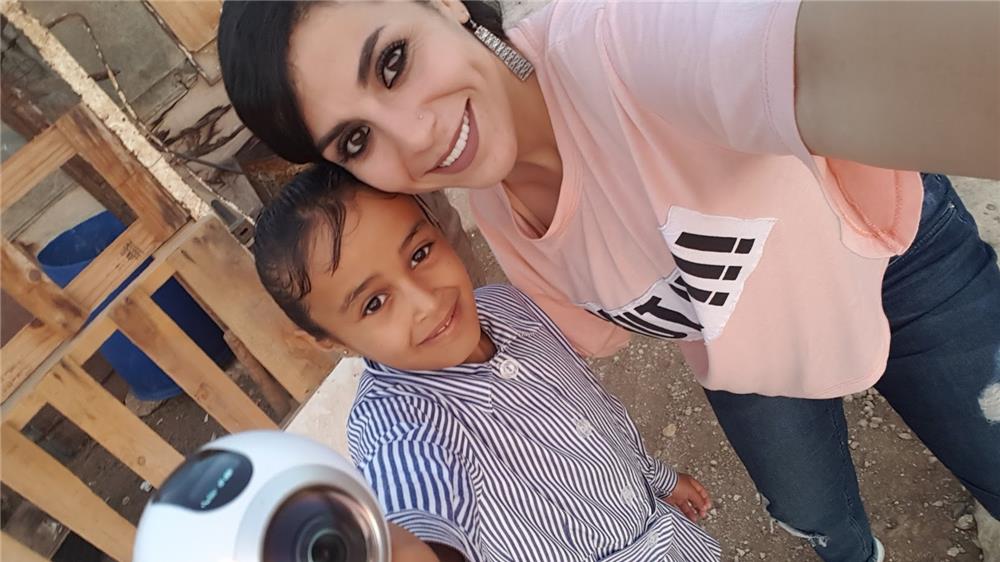غالبا، تقدمنا نشرات الأخبار على أننا أرقام، عشرون شهيداً، ثلاثون أسيراً ومئات المصابين ربما. ومع تسارع الأحداث وكثرتها في العالم العربي على وجه الخصوص، أصبح الخوض في التفاصيل والمشاعر تحدياً يواجه معظم الصحفيين.
لكن دائما، هناك تلك المبادرات التي تنقل لك القصة لتعيشها بكامل إحساسك وعقلك، بطريقة تجمع بين الطريقة التقليدية للأخبار مع تكنولوجيا الواقع الافتراضي بغرض ربط المتلقين بالقصة.
لذلك أخذ قسم الابتكار والتطوير في الجزيرة على عاتقه تقديم محتوى مرئي يتضمن فيديو VR و360 درجة على الشبكة من خلال "Contrast" (كونتراست)، استوديو الوسائط في الجزيرة، ومن خلال طاقم ينتج محتوى أصليا متميزا بالإضافة إلى محتوى مشترك مع شركاء داخل وخارج شبكة الجزيرة.
وما يجعل "كونتراست" أكثر تميزاً هو أن المحتوى المصور بتقنية 360 درجة أو تجارب الواقع الافتراضي التي ننتجها، ترتكز بشكل رئيسي على الشخصية، وهو ما يقرِّب المشاهد أكثر لمحور القصة بحيث يكون قادراً على تكوين القصة الخاصة به أيضاً، وأن يكون أقرب مع الشخصية المركزية والبيئة المحيطة بها بشكل شخصي أكثر.
مبادئ الصحافة نفسها، المختلف هو الإحساس بالانتماء والتفاعل مع الحدث؛ فصحافة الواقع الافتراضي تخضع للمعايير الأخلاقية نفسها التي ينبغي على العاملين في الإعلام التقليدي تطبيقها عند إنتاج أي محتوى، كالرسوم المتحركة أو الفيديو الواقعي، مع الانتباه إلى ضرورة جمع مصادر الأحداث الحقيقية لتركيب الأجزاء معاً، الأمر الذي يستغرق كثيراً من الوقت والجهد، سواء عند استخدام منصات الأخبار التقليدية أو الواقع الافتراضي.
نحن نرى في المتلقي جزءا هاما له سرده الخاص للحدث، وله الخيار بالتركيز على جزء معين دون غيره، وهو ما قد يغيب عن بال معظم العاملين في مجال الصحافة، مع الانشغال بالأخبار والتدفق الهائل للمعلومات على اختلافها.
ما الفرق بين الواقع الافتراضي "VR" وتقنية التصوير 360 درجة؟
يتضمن التصوير بتقنية 360 درجة، إنتاج فيديوهات صوِّرَت بواسطة الكاميرات الدائرية التي تسجل المقطع تلقائيا بزاوية 360 درجة، أي من كل الجهات. وتتيح هذه التقنية للمشاهد أن يكون جزءا من المشهد المصوَّر وأن يختار زاوية النظر التي يريد بأي اتجاه.
الكاميرات الرقمية ذات العدسة الواحدة والهواتف الذكية لا تدعم تصوير فيديوهات 360 درجة، ما يمكنه القيام بذلك هي كاميرات عادة ما تكون دائرية أو مربعة وتتضمن العديد من العدسات مثل GoPro Omni Rig و Samsung Gear 360 و Samsung Round.
يمكن للمشاهد استخدام الهاتف المحمول أو جهاز الحاسوب لمشاهدة الأفلام المصورة بهذه التقنية بكل بساطة، وتكتمل المتعة عند مشاهدة فيديوهات الـ360 درجة بنظارات الواقع الافتراضي (virtual reality headset)، تلك النظارات أصبحت أسعارها في متناول الجميع ومنتشرة في الدول العربية.
وهكذا، تسمح تقنيتي الواقع الافتراضي "VR" والتصوير 360 درجة، بالتفاعل مع الفيديوهات والدخول في تلك التجربة الافتراضية عبر محاكاة الصوت والصورة.
وقد تذهب تقنية الواقع الافتراضي أبعد من ذلك عبر تصميم تجربة بشكل كامل ثلاثية الأبعاد وإضافة معطيات أخرى يمكن للمستخدم التفاعل معها. الرابط التالي يوضح كيفية مشاهدة فيديو بتقنية 360 درجة عبر الهاتف المحمول.
لماذا الواقع الافتراضي وفيديوهات 360؟
أصبح استخدام الواقع الافتراضي (VR) في الصحافة أكثر شيوعا، وليس من الصعب معرفة السبب. إذ تضع هذه التقنية المتلقين داخل موقف قد لا يصلون إليه في حياتهم اليومية. عندما يتمكن المشاهدون من المرور عبر مخيم للاجئين بدلاً من مجرد مشاهدته على الشاشة، سيعرفون أكثر عن أزمة اللاجئين، سيعيشون جزءا من مشاعرهم، وسيكونون أقرب لظروفهم وما قد يمرون به.
نفكر في الأشخاص والأماكن والخبرات، بحيث يصبح كل عنصر من هذه العناصر جزءًا كبيرا من شخصية الفيلم وموضوعه. نحن نفكر في العمل، مع الأخذ بالاعتبار أن الفضاء العام للقصة يحتوي على محفز بصري غني في 360 درجة.
يستطيع طاقم "كونتراست" الوصول إلى قصص حقيقية وقوية في مناطق العالم الأكثر تضرراً اجتماعيا واقتصاديا وسياسيا، وتتيح هذه التقنيات الجديدة نقل المشاهدين فعليا ليعيشوا ويشعروا بهذه القصص. الهدف هو تشكيل حلقة وصل بين الجمهور الذين يستخدمون أحدث تقنيات الواقع الافتراضي مع الأشخاص والثقافات المختلفة ممن تُسرد قصصهم من خلال هذا الأسلوب السردي الجديد لوسائل الإعلام الغامرة.
مؤخرا أنتجنا فيديو من غزة، حيث تنقلك هذه التجربة لتعيش في أزقة غزة وتمشي مع الشخصية الرئيسية احمد أبو بيض، الذي فقد قدمه نتيجة القصف الذي تعرض له بيته الواقع في حي الشجاعية في غزة عام 2014، وبساق واحدة يمارس محمد كرة القدم كلاعب في فريق لمبتوري الأطراف الذين فقدوا إحدى أقدامهم في حروب غزة وأحداثها.
في الواقع الافتراضي، ما زلنا بحاجة إلى أن نتذكر أهمية القصص في نقل القضايا العالمية والبشرية الملحة. ولا شك أن تحديد كيفية تنفيذ ذلك عبر تقنية الواقع الافتراضي سيكون تحدياً لا ينتهي، ولكن إيجاد تقنياتٍ مبتكرة لمساعدة الجمهور على التعاطي مع التصوير 360 درجة، والتفاعل الكامل مع القصة الصحفية سوف تساعد على تحويل التقارير الإخبارية بتقنية 360 درجة إلى تجربةٍ من شأنها ليس فقط أن تنطبع بشكل أفضل في أذهان المشاهدين، ولكن أيضاً تجعلهم شغوفين، وحريصين على مشاهدة المزيد من مثل ذلك المحتوى الغني بصرياً ومعلوماتياً في المستقبل.
لذلك ننتج أفلاما وثائقية أطول، مثل فيلم "لعنة زيت النخيل" الذي أنتجناه بالتعاون مع Al Jazeera - 101 East في ماليزيا.
شعبي وحكاياتنا
هذا التقنية جديدة، إذ نحرص على إنتاج محتوى متنوع وتكوين شبكة واسعة من العاملين من مختلف البيئات والمجتمعات. كما أن طاقمنا يعمل مع صانعي أفلام محليين من مختلف أنحاء العالم، سعياً لتمكينهم في مجالات صحافة الواقع الافتراضي، ومثال ذلك مبادرتنا "شعبي وحكاياتنا" في مجتمعات كينيا، والأردن، وفلسطين، وجنوب إفريقيا، ولبنان، وتونس، والمغرب، ونيجيريا. تضمنت المبادرة تدريباً لمجموعات صانعي أفلام شابة تنتج بالتزامن مع انتهاء التدريب عدداً من القصص المصورة بتقنية 360 درجة والمتعلقة بشكل رئيسي بمجتمعاتهم، نحرِّرها وننشرها على منصات التواصل الاجتماعي الخاصة بشبكة الجزيرة الإعلامية.
كما درَّبنا مراهقين سوريين في مخيم الزعتري في الأردن وصحفيين آخرين في جنوب السودان، أنتجوا قصصا تعكس واقعهم ومجتمعاتهم على اختلافها.
وفي الوقت الذي يصوَّرُ فيه الكثير من أفلام الواقع الافتراضي في البلدان النامية، تتم العروض خارج تلك البلدان، لأن الأشخاص المتأثرين بالقضايا التي تتناولها الأفلام الوثائقية، غالباً، لديهم فرص قليلة للغاية لمشاهدة فيلم الواقع الافتراضي.
لهذا، وكجزء مستمر لتوفير المزيد من الفرص للأشخاص في العالم النامي لمشاهدة والتفاعل مع قصص الواقع الافتراضي عرضنا العديد من أعمالنا في مختلف دول العالم النامي، وهو ما فعلناه في فيلم "النفط في جداولنا" حيث عرضناه في لاغوس، البلد الذي أُنتج فيه.













































